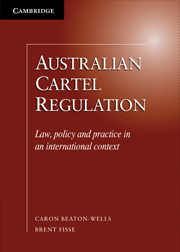Book contents
- Frontmatter
- Contents
- About the authors
- Preface
- Acknowledgements
- Abbreviations
- 1 Introduction
- 2 The legal framework governing cartel conduct
- 3 Collusion (contracts, arrangements, understandings)
- 4 Cartel and other provisions
- 5 Fault elements of the cartel offences
- 6 Individual liability for cartel conduct
- 7 Corporate liability
- 8 Exceptions
- 9 Enforcement policy
- 10 Immunity and cooperation policies
- 11 Sanctions
- 12 Compliance and liability control
- 13 Conclusion
- Appendix Trade Practices Act 1974 (Cth) Pt IV Div 1; Pt IV Div 2 s 45
- Index
2 - The legal framework governing cartel conduct
Published online by Cambridge University Press: 05 December 2011
- Frontmatter
- Contents
- About the authors
- Preface
- Acknowledgements
- Abbreviations
- 1 Introduction
- 2 The legal framework governing cartel conduct
- 3 Collusion (contracts, arrangements, understandings)
- 4 Cartel and other provisions
- 5 Fault elements of the cartel offences
- 6 Individual liability for cartel conduct
- 7 Corporate liability
- 8 Exceptions
- 9 Enforcement policy
- 10 Immunity and cooperation policies
- 11 Sanctions
- 12 Compliance and liability control
- 13 Conclusion
- Appendix Trade Practices Act 1974 (Cth) Pt IV Div 1; Pt IV Div 2 s 45
- Index
Summary
Introduction – a complex regime
The statutory regime that applies to cartel conduct following the amendments to the TPA by the CC&OM Act is complex. Notwithstanding several revisions to the CC&OM Bill during its evolution, many of the issues were not addressed and, in general, there is considerable uncertainty as to how the provisions are to be interpreted and applied. The Explanatory Memorandum to the CC&OM Bill did not tackle much less resolve many of the issues. There is no white paper or law reform report to assist.
This chapter explains the statutory framework governing cartel conduct in Australia under the amended TPA (Section 2.2) and outlines the coverage of the statutory regime and its limitations in relation to different types of entities, territories and time periods (Section 2.3). The chapter also addresses the key issue in the design of the statutory framework, namely the extent to and ways in which conduct warranting criminal liability are differentiated from conduct warranting civil liability (Section 2.4).
Outline of the statutory regime
The prohibitions on cartel conduct under the TPA are directed at conduct involving a contract, arrangement or understanding between competitors that contains a particular type of provision. The prohibitions are attracted either bymaking a contract or arrangement or arriving at an understanding containing a provision or giving effect to a provision in a contract, arrangement or understanding.
Prior to 2009, the structure of the cartel prohibitions was relatively simple. Section 45(2) of the TPA contained civil per se prohibitions concerned with two types of provision: price fixing provisions and exclusionary provisions, with a default prohibition relating to provisions that have the purpose, effect or likely effect of substantially lessening competition.
- Type
- Chapter
- Information
- Australian Cartel RegulationLaw, Policy and Practice in an International Context, pp. 10 - 35Publisher: Cambridge University PressPrint publication year: 2011

